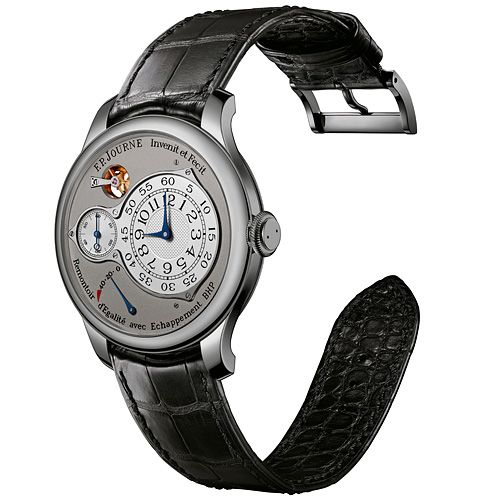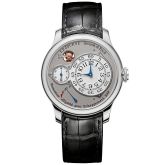FP Journe - 1510 CO 42 PT Souveraine Chronomètre Optimum 42 Platinum
we may be compensated
if you make a purchase.
| Brand: | FP Journe |
|---|---|
| Family: | Souveraine |
| Reference: | 1510 CO 42 PT |
| Name: | Souveraine Chronomètre Optimum 42 Platinum |
| Movement: |
FP Journe caliber 1510 CO
Hours, Minutes, Small Seconds, Jumping Seconds | Power Reserve Indicator
|
| Produced: | 2012 |
| Limited: | No |
Case
| Material: | Platinum |
|---|---|
| Glass: | Sapphire |
| Back: | Open |
| Shape: | Round |
| Diameter: | 42.00 mm |
| Height: | 10.10 mm |
Dial
| Color: | Silver |
|---|---|
| Material: | Yellow Gold |
| Indexes: | Arabic Numerals |
| Hands: | Proprietary |

FP Journe 1510 CO 42 PT description
The Chronomètre Optimum symbolises the very essence of precision for a wristwatch endorsing the accomplishment of F.P.Journe chronometric research.
The constant-force remontoire (patent EP1528443.A1) balances the driving force applied to the escapement to make it constant. By adding an extra gear representing an independent system wound in short spurts by the mainspring, the escapement ensures the balance's isochronism. This remontoire, made of titanium for the first time, maintains its balance in different positions, for greater efficiency.
The EBHP High-Performance Bi-axial Escapement has also been patented (patent EP11405210.3). This two-wheel direct impulse escapement functions without oil and is the only direct impulse escapement to start up on its own. But not only does it function without lubricant, it also has far greater output than the majority of escapements: 50 hours without loss of amplitude. Many dual-wheel escapements have been created in the past, the most efficient being the "natural" escapement invented by A-L. Breguet (†1823)
The aesthetics of the hour, minute and small second displays and of the 70-hour power reserve are in perfect harmony with the visible wheel of the constant-force remontoir on the face of the dial. The back of the 18ct rose Gold movement reveals, through the sapphire back, a surprising natural dead beat second defined by a seconds circle screwed onto the movement's bridges.



